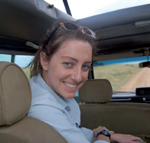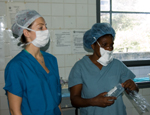|
|
|

|
The Road to
Tanzania
|
Anesthesia
Department joins outreach to Africa
by Dawn Brazell
Public Relations
Carlee Clark, M.D., left Tanzania surprised by the nurses who were
asking if they could keep her tennis shoes and operating garb. She
gladly agreed, but what she got in return was well worth it, she said.
 Dr. Carlee Clark,
recently visited Tanzania as part of a medical mission trip to see ways
MUSC's Department of Anesthesiology can help improve the training of
the region's anesthetists. She enjoyed seeing the wildlife while she
was there. Dr. Carlee Clark,
recently visited Tanzania as part of a medical mission trip to see ways
MUSC's Department of Anesthesiology can help improve the training of
the region's anesthetists. She enjoyed seeing the wildlife while she
was there.
 Clark, who
went to Africa for two weeks in February as a representative of MUSC’s
Anesthesia & Perioperative Medicine Department, worked with staff
to assess and find ways to improve the way anesthesia is being done.
The trip is part of the Madaktari program started by Dilantha B.
Ellegala, M.D., in MUSC’s Department of Neurosciences. The non-profit
program works with the country’s Ministry of Health and regional
hospitals to create sustainable health care in East Africa. For information on the Madaktari program,
visit http://tiny.cc/muscafrica. Clark, who
went to Africa for two weeks in February as a representative of MUSC’s
Anesthesia & Perioperative Medicine Department, worked with staff
to assess and find ways to improve the way anesthesia is being done.
The trip is part of the Madaktari program started by Dilantha B.
Ellegala, M.D., in MUSC’s Department of Neurosciences. The non-profit
program works with the country’s Ministry of Health and regional
hospitals to create sustainable health care in East Africa. For information on the Madaktari program,
visit http://tiny.cc/muscafrica.
Neurosurgeons volunteering in the country realized that the anesthesia
being provided wasn’t very good, she said. Ellegala decided to seek
help from MUSC anesthesiologists who could provide the training to
allow them to take better care of patients.
Clark decided she’d love to go.
Her goal was to observe, assess weaknesses and strengths, and find the
best ways to train the anesthetists there. This was her first trip to
Africa and her first mission trip. She had no idea what to expect at
Bugando Medical Center, but she went with an open mind. She was pleased
to get a warm, friendly welcome, she said.
 Anesthetist
students at Bugando Medical Center gather for morning report. Anesthetist
students at Bugando Medical Center gather for morning report.
“What I found was a group of amazing people trying to practice good
anesthesia with limited resources and a mentality towards patient care
that was inconsistent. I spent the majority of my time observing,
asking questions and commending them when they did something well.”
Her strategy worked well, allowing her to quickly gain their trust, she
said. She met with the one anesthesiologist, and then the nine senior
anesthetists, who were students. Since they get little supervision in
the operating room, the senior anesthetists were excited to have her
with them to answer questions, she said.
“What I learned was both fascinating and frightening at the same time.”
The senior anesthetists, who get paid salaries at a nursing level, are
responsible for the 24/7 coordination, administration and education
that happens in the six operating rooms at Bugando Medical Center. Two
of them also share the responsibility for scheduling, ordering and
maintaining of equipment and the ordering of medications.
There currently are 23 anesthetist students, with their training
program being only 12 months long, she said. A nurse who “monitors” the
patients runs the Post Anesthesia Care Unit (PACU). The patients are
suctioned, extubated and then watched only five to 15 minutes before
being shipped back to the floor.
 Clark supervises
and teaches one of the anesthetist students in the operating room. Clark supervises
and teaches one of the anesthetist students in the operating room.
About 200 cases are done a week in six operating rooms, with 50 to 60
cases in general surgery and orthopaedics being scheduled on Mondays,
Wednesdays and Fridays. The wait list for surgery is almost three
months long. Patients have to pay up front or their cases are
cancelled. If they can pay more, their cases are pushed up on the
schedule. The anesthetists try to keep the patient’s costs down by
limiting medications or using local or regional whenever possible, she
said.
“They try to make things as cheap as possible. Some patients get no
pain medicine at all. The patients are great. They’re very stoic.”
Clark said she found sometimes the staff was more concerned about speed
than safety. Abnormal laboratory results were not repeated, for
example. The range of education also varied greatly among the staff,
with some having a very poor level of basic anatomical knowledge.
Medical staff members also can be stretched thin because they’re
serving multiple roles. For example, there’s no circulatory nurse so
the anesthesiologist has to perform a dual role, she said.
“On the slower days, the operating rooms get cleaned more and the
patients get more time in the PACU. On busy days, it is impressive how
well everyone works together to get things done as quickly as possible,
but it is obvious that patient care suffers on these days.”
Clark said staff members are aware that they’re not practicing up to
the standards in the United States, but that she was impressed by how
well they did with often limited resources. She spent much of her time
assessing their needs and providing training, since the project is to
help them be self-sustaining.
“It’s a very interesting situation because it’s a training center. It’s
a place we can effect change. It was a welcoming environment and one in
which residents, CRNAs and attendings could all go and bring about
change. I think this will be a great opportunity for the department of
anesthesia, and I’m excited to be a part of it.”
Scott T. Reeves, M.D., and chairman of MUSC’s Department of Anesthesia
& Perioperative Medicine Department, left May 2 for 10 days to
visit various sites to determine where training will be most effective.
Clark said she definitely will be going back at some point. She would
like to get more students there interested in anesthesia and encourage
them to apply for postgraduate training. She also wants to encourage
them to spend more time with patients and examine how they handle their
case loads to create a safer environment.
“I enjoyed working with them. They’re great. They want so badly to be
doing better.”
Friday, May 7, 2010
|
|
|




 Clark, who
went to Africa for two weeks in February as a representative of MUSC’s
Anesthesia & Perioperative Medicine Department, worked with staff
to assess and find ways to improve the way anesthesia is being done.
The trip is part of the Madaktari program started by Dilantha B.
Ellegala, M.D., in MUSC’s Department of Neurosciences. The non-profit
program works with the country’s Ministry of Health and regional
hospitals to create sustainable health care in East Africa.
Clark, who
went to Africa for two weeks in February as a representative of MUSC’s
Anesthesia & Perioperative Medicine Department, worked with staff
to assess and find ways to improve the way anesthesia is being done.
The trip is part of the Madaktari program started by Dilantha B.
Ellegala, M.D., in MUSC’s Department of Neurosciences. The non-profit
program works with the country’s Ministry of Health and regional
hospitals to create sustainable health care in East Africa. 
